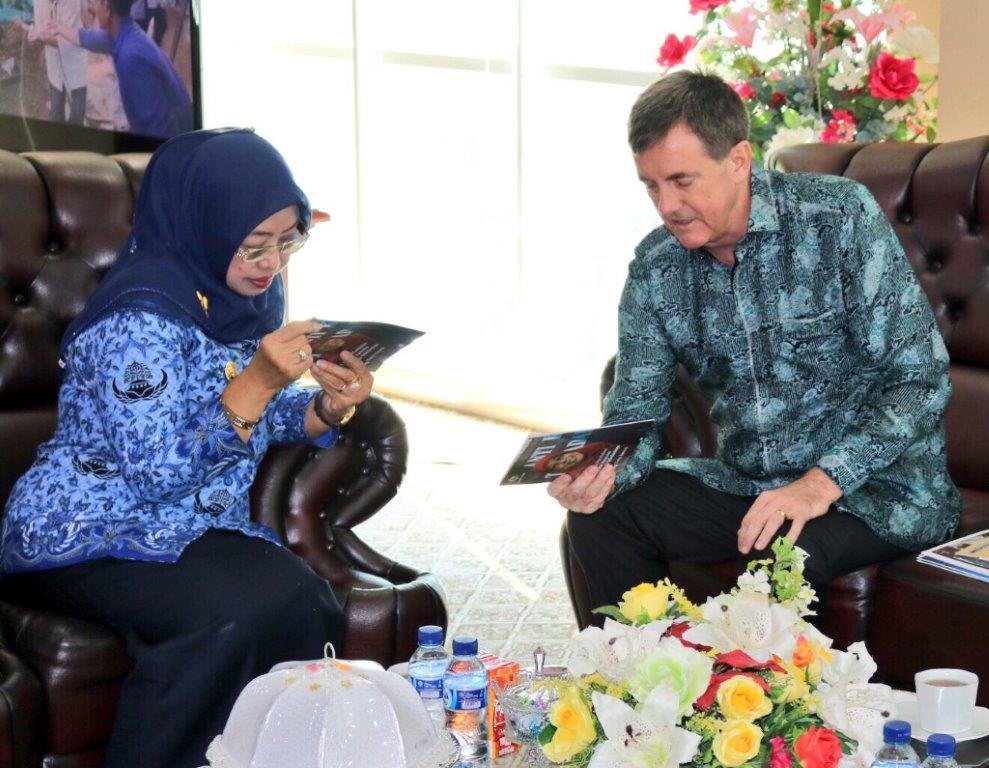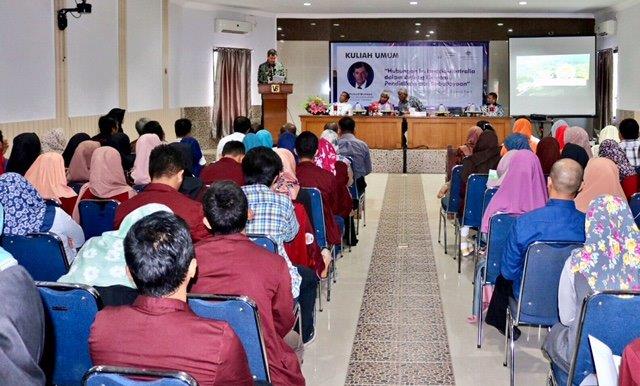Until 2004 West Sulawesi was part of the province of South Sulawesi. But under the process of regional decentralisation called “pemekaran” (division, or literally, blooming) the people of an area along the central-west coast line of the island of Sulawesi decided they wanted to break away and form their own province. At the time this process brought with it financial benefits for the new area –funds for a new government office complex, for the new regional administration, and for new infrastructure for the new provincial capital. The separation also brought a level of independence in decision-making to the local community of about 1.3 million people. The majority of the population of West Sulawesi live along the coast and are Muslims from the Mandar ethnic group. About 15 percent of the population are Christian and live mainly in the mountainous Mamasa regency.
This province remains little-developed but has great tourism potential. It recently celebrated the establishment of Indonesia’s 53rd national park: the Taman Nasional Gandang Dewata, which encompasses the slopes of Mount Gandangdewata to the north of Mamasa. This park hosts many species endemic to the Wallacea region, and a large tract of the only remaining pristine forest on Sulawesi. Farmers in the foothills grow cocoa, and there is some palm oil production as well as rice along the coast. As in most parts of Sulawesi, there are nickel deposits but also potential reserves of Thorium and Uranium. The National Nuclear Energy Agency (BATAN) has detected relatively high levels of radiation in the Mamuju regency. The provincial growth rate of 8.7 per cent is well above the national average, but average family incomes are low as most people still live a subsistence lifestyle. Over 30 per cent of villages do not yet have electricity.
We arrived in the capital of Mamuju on a Sunday after a 40 minute flight from Makassar. Within an hour we had caught a boat across to the island of Karampuang, which occupies Mamuju Bay, and I was snorkelling off the pier watching thousands of bright tropical fish flitting about a coral reef. The island is pretty but locals still have a problem with plastic waste – obvious along the sides of the footpaths through the kampung.
My host was the provincial head of tourism, Pak Yakub. His staff are very interested in the short course on Sustainable Tourism that we are organising for participants from across eastern Indonesia (see my previous blog). The West Sulawesi government – like most other provinces in eastern Indonesia – sees tourism as offering an economic future for its citizens. But currently in Mamuju there is only one good hotel and Mamasa has only basic homestay-type accommodation. And the five hour drive from Mamuju to Mamasa is not for the faint-hearted.
I met the Vice-Governor of West Sulawesi, Ibu Eny Anggraeni Anwar, the only female  vice governor in eastern Indonesia. There are no female governors. Ibu Eny represented West Sulawesi in the national parliament in Jakarta until she won the provincial election in February 2017.
vice governor in eastern Indonesia. There are no female governors. Ibu Eny represented West Sulawesi in the national parliament in Jakarta until she won the provincial election in February 2017.
Ibu Eny was very interested in the education cooperation we were offering and the schools that Australia had built across West Sulawesi under the (now-completed) Australia Indonesia community-based school construction program. Over the ten years to the end of 2016 Australia funded the construction of 2,725 junior high schools across Indonesia, including 24 in West Sulawesi, all in isolated locations. I would visit one in Polewali during my visit. This program has helped improve school participation rates and meet the national government’s goal of achieving a minimum of nine years of schooling for all children.
The next day, after a bone-jarring five hour drive south along the coast, I met the Bupati of Majene, Dr H Fahmi Massiara. Also present were the local police chief, army commander, district chief judge, chief prosecutor and head of the local parliament. Dr Massiara told me that Majene was once the largest town in the area but had been overtaken by Mamuju since the pemekaran in 2004. The new capital Mamuju got the airport, a new sea port, hotels and government infrastructure. Majene got the University of West Sulawesi, a small community of some 3,000 students.
Next morning I met the Rector of the University of West Sulawesi, Dr Akshan, at breakfast. I was to give a lecture on “Challenges Facing University Students in a Changing World”. But as the university is still in temporary buildings the lecture was in a hall at my hotel. Around 100 staff and students crammed in to this space to hear me; afterwards the questions were interesting. Aren’t we at risk of “acculturation” if we have contact with foreigners? Rich countries should give us more foreign aid, but shouldn’t make demands on us: what is your response? How do you solve the problem of graduate unemployment in your country?

Dr Akhsan has a good project ahead of him: building a new campus on a hill overlooking the beautiful Majene Bay - but he is still waiting for funding from Jakarta. Dr Akshan also faces a challenge with students who have little contact with the outside world. They need greater interaction to help them integrate safely with the national and global community. I promised I would try to get Australian universities to connect with them.
Indeed, my opportunity to do just that came the next evening when I hosted dinner for a group of researchers from the University of Sydney – in the lovely Hotel Ratih in Polewali. Believe it or not, we were in this tiny town at the same time: they were running a cocoa sustainability and farmers’ health survey project in conjunction with the Bogor Institute of Agriculture and Universitas Hasanuddin in Makassar. I mentioned to the professors from Sydney University that the University of West Sulawesi was just down the road, and looking for new partnerships.
***
